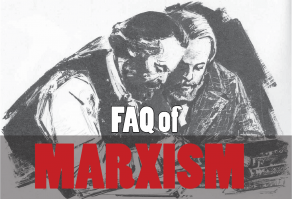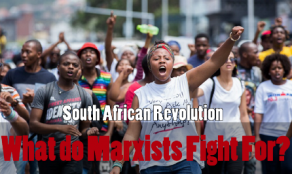South Africa has faced one of the strictest lockdown responses to the COVID-19 pandemic in the world. The pandemic and the subsequent lockdown has been a disaster for the ordinary working masses.
The blatant and deep inequality in South Africa has only been highlighted by the pandemic with multitudes of workers losing their jobs. Many people are not formally employed, and as a result have not been able to claim TERS or any government unemployment insurance. In addition, the material conditions of the working class in general mean that most were not in the position to live off savings while not being able to work (whereas the minority, the middle and upper class society, had this luxury even if they temporarily lost income).
Throughout the lockdown the state has engaged in the forced removal and demolition of informal settlements, leaving the poorest without shelter in the middle of one of the coldest winters in years. Forced removals are deeply woven into the fabric of South African history. From the days of the colonial state where native people were regularly moved off land, and enslaved or put to work for little pay. This culture was deepened by the Apartheid state, which had a legal mandate to segregate society based on race. It systematically removed black people from urban suburbs to urban outskirts and shaped the racially divided society we experience today. In the twenty-six years since the emergence of ‘democratic’ South Africa little has changed. In fact, in the City of eThekwini and City of Cape Town, forced removals are routine in areas surrounding the two cities.
Whatever legal backing these removals had before the lockdown, they lost with the outlawing of evictions during the lockdown period. However, during the lockdown this continued as normal removing people from private and public land without court orders.
In March regulations were gazetted which effectively required law enforcement and private landlords alike to obtain a court order if they aimed to legally evict any occupants. The contravention of which was demonstrated legally with court action in July, when the Cape Town High Court passed down judgement on an eviction case in which members of an Empolweni informal settlement were forcibly evicted.
The court ruled that the action taken by the City of Cape Town in Khayelitsha was completely unlawful, and in breach of national lockdown regulations. This caught the attention of the country and resulted in various activist groups putting increased pressure on local governments to stop forced removals.
While the case has also spurred a bout of local public action in Khayelitsha where residents are demanding an end to forced removals and real solutions to the housing problem facing the city. Meanwhile the City mayoral committee member Malusi Booi and Mayor Dan Plato, maintain that it was the actions of individual security officials that was illegal, and that the ongoing offensive of informal settlements is necessary to ensure that effective public projects can go ahead. The plans of which are not available on public record.
Poor people in eThekwini face many of the same conditions. The City uses the services of private security agencies, who arrive at land occupations without any legal documentation and through the excessive use of force remove informal dwellers. 33 year old Siphesihle Yaka was just one of many people who were forcibly removed from Ekuphumuleni informal settlement in March. He suffered injuries inflicted from an axe and pickaxe at the hand of private security, and was lucky to escape without more serious injury. He is a father of two and currently unemployed.
As has become standard practice, officials demolished homes and the belongings inside, then burnt the material used to build the homes. Even if there is a court order allowing “illegal structures'' to be demolished, the burning of housing materials and personal belongings speaks to the maliciousness of local governments.
In another incident in Cape Town, residents of Hangberg informal settlement in the fishing village of Hout Bay faced the same harassment from the Red Ants (private security, relocation and eviction services) and SAPS in July. Mothers and children were driven from their homes in storming conditions, and had to watch while their few belongings were burnt. Residents took the matter to court and won. The City has been instructed to rebuild the structures they illegally demolished.
The state deployed the police and military to working class and poor areas, engaging in barbaric bruteforce when ‘enforcing’ lockdown regulations. This has, in some cases, even lead to the murder of innocent people in more than a few cases. Most infamously Colin Khosa, whose murderers now face criminal charges. This all while bourgeoisie suburbs barely had any contact with security forces–if they even saw them said forces in their suburbs.
These mass evictions are the reality of poor people in South Africa. In fact there are no political parties in Parliament which have openly condemned the evictions of the two informal dwellers. This is a symptom of a capitalist system. Under capitalism production is for private profit and not for the needs of its people. This attitude runs across political lines and makes it clear that no existing democratic process is sufficient to solve the plight of the poor and working class people in this country. People are now left with no choice but to take action into their own hands, organise as communities and mobilise against the capitalist class!



